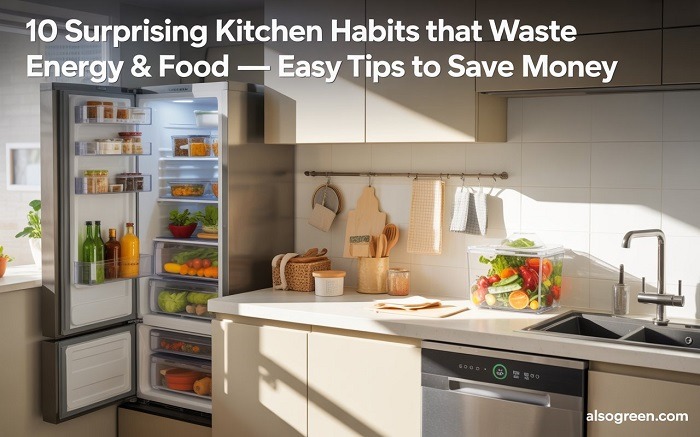Why Your Kitchen Still Wastes Too Much — And 10 Surprising Habits to Change That
Find out 10 simple kitchen habits that unknowingly waste your energy, food, and money — and learn easy, eco-friendly tips to save more and reduce waste in your U.S. home.


Why Your Kitchen Still Wastes Too Much — And 10 Surprising Habits to Change That
(Even If You Think You're Doing Everything Right)
Your kitchen should be a place of comfort and creativity. However, for many of us, it's also where a significant amount of energy, food, and money quietly slips away. You might think you're already careful, yet small habits often cause waste without you realising it. The good news? Most of these habits are easy to change once you recognise them.
This article reveals 10 surprising kitchen habits that waste resources, along with simple, eco-friendly ways to stop them. Whether you're a busy parent, a student, or simply someone who wants to save money and reduce waste, these tips will help you make your kitchen greener and brighter, with minimal hassle.
1. Leaving Appliances Plugged In When Not in Use
Many small kitchen appliances, like toasters or coffee makers, still use electricity even when switched off. This "phantom energy" quietly adds up on your electric bill and increases your carbon footprint.
Easy fix: Unplug these devices when not in use or connect them to a power strip with an on/off switch. Consider investing in smart plugs, such as the Amazon Smart Plug, to easily control appliances remotely and reduce energy consumption.
2. Running the Dishwasher Half Full or Overloading It
Running your dishwasher when it's half empty wastes water and energy. But overloading it can prevent dishes from getting clean, forcing you to rerun the cycle.
Pro tip: Run your dishwasher only when it's full, but avoid cramming dishes in. Use the eco or energy-saving cycle if your dishwasher has one, such as the Bosch 300 Series Dishwasher, which is known for its efficiency.
3. Preheating the Oven When It's Not Needed
Preheating consumes a significant amount of energy, especially if the oven remains empty for an extended period. However, not all recipes require preheating.
Smart move: Skip preheating when cooking casseroles, frozen meals, or roasting vegetables. Preheat only when baking bread, pastries, or dishes requiring precise temperatures.
4. Cooking with Pots and Pans Uncovered
Using lids on pots and pans traps heat inside, so food cooks faster, saving time and energy.
Try this: Cover pots when cooking soups, boiling pasta, or making rice. If you need new cookware, consider energy-efficient options, such as the T-Fal Ultimate Hard Anodised Nonstick Cookware Set.
5. A Disorganised Fridge Leading to Food Waste
A cluttered fridge means food often gets forgotten and spoils, contributing to one of the most significant waste problems in U.S. kitchens.
Fix it: Use clear containers, label everything with dates, and practice the "first in, first out" principle — put older items at the front to use them first. Storage solutions, such as OXO Good Grips POP Containers, can help keep things tidy and fresh.
6. Storing Food Improperly
How you store food affects how long it stays fresh. For example, herbs last longer when kept in jars of water, and wrapping greens in paper towels helps absorb moisture and prevent wilting.
Bonus tip: Freeze leftovers promptly to avoid spoilage. Use freezer-safe containers, such as Rubbermaid Brilliance Food Storage, to keep your meals fresh for longer.
7. Using Disposable Paper Towels Instead of Reusable Cloths
Paper towels generate a significant amount of waste and incur costs over time.
Eco-friendly swap: Use washable microfiber cloths or repurpose old T-shirts for spills and cleanup. The Amazon Basics Microfiber Cleaning Cloths are affordable and durable.
8. Buying Too Much or Without a Plan
Impulse buys, or shopping without a plan can lead to food going bad before you have a chance to eat it.
Plan: Use a meal planning app or a notepad, shop with a list, and buy local, seasonal produce that lasts longer. Apps like Mealime help streamline this process.
9. Relying on Single-Use Plastic Bags and Containers
Plastic waste is a major environmental issue, contributing to landfill overflow and pollution.
Switch: Use reusable silicone bags, beeswax wraps, or glass containers. Popular choices include Stasher Reusable Silicone Bags and Bee's Wrap Food Storage.
10. Throwing Food Scraps in the Trash Instead of Composting
Food scraps in landfills generate methane, a potent greenhouse gas.
Start composting: Keep a small bin on your counter for veggie peels, eggshells, and coffee grounds. If you lack space, check local community compost programs. Try the iTouchless Compost Bin for a compact and odour-free option.
Bonus Tips to Save Even More Energy and Reduce Waste
Use LED lighting: LED bulbs, such as Philips LED Soft White bulbs, use less energy and last longer.
Choose multi-use tools: Reduce clutter with versatile gadgets.
Repair instead of replacing: Fix broken appliances before buying new ones.
Bulk buy smartly: Buy in bulk only if you can consume it before it spoils.
Frequently Asked Questions (FAQs)
Q: How can I reduce food waste if I live alone?
A: Freeze leftovers in small portions, plan meals carefully, and buy only what you'll eat in a few days.
Q: Can I compost if I live in an apartment?
A: Yes! Compact, odour-free compost bins are available, and many cities offer drop-off locations.
Q: How much can unplugging appliances save?
A: Unplugging can save around $100 a year, depending on your appliances and usage.
Q: Are natural cleaners effective for tough kitchen messes?
A: Definitely! Baking soda, vinegar, and castile soap work great and are safe and eco-friendly.
Final Thoughts
Small changes in your kitchen habits can make a big difference. Begin by unplugging unused appliances and keeping your fridge well-organised. Over time, these simple actions will become second nature, helping you save money, reduce waste, and create a healthier home environment.
Remember, it's about progress, not perfection. Every step you take brings you closer to a greener, more sustainable kitchen. Your journey starts now, one easy habit at a time.
⭐ Related Posts You May Like:
Ready to take the next step toward a greener kitchen?
Visit our Sustainable Kitchen Shop to explore reusable cloths, storage solutions, compost bins, and more eco-friendly essentials — all in one place.
Also Green
Embrace a mindful and eco-friendly lifestyle today.
Contact
contact@alsogreen.com
© 2025 Also Green. All Rights Reserved
+14706521930
